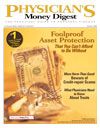Publication
Article
What Physicians Need to Know About Trusts
Author(s):
Most physicians are familiar with the use ofa trust to maintain privacy and to passwealth to their children. They are unawarethat it can, if certain sophisticated legal techniques areutilized, not only pass on wealth but also protectwealth from malpractice, divorce, and creditor claimsfor countless downstream generations.
The trust is unmatched as a legal strategy becauseit can be designed in limitless ways. Which type oftrust will be most effective for you?
Common Forms Utilized
A living trust is revocable and self-settled. It providesno asset protection for the person (ie, settler,you) who sets it up and places assets into it. If fundedproperly (eg, by real estate transferred into it byrecorded deed or by brokerage and bank accountsproperly retitled), it does provide estate tax and probateavoidance. Structured properly, however, it canalso give unsurpassed asset protection, divorce protection,and potentially hundreds of thousands ofdollars in estate tax benefits for your children.
The physician can utilize an irrevocable life insurancetrust (ILIT) to keep insurance free of the almost50% estate tax. In addition, ILITs protect your policy'scash value from your and your family's creditors.If the generation skipping transfer tax exemption isapplied to your policy, you could forever exempt millionsof dollars from inheritance taxation. Manyphysicians today are setting up their insurance trustsas intentionally defective irrevocable trusts, whichcan, in appropriate circumstances, considerablylower your estate taxes.
Powerful Options Available
A non-self-settled trust is a trust set up for yourchildren, not by them (ie, self-settled), but by you(ie, non-self-settled). This Heritage Trust™is thestrongest asset protection technique availabledomestically and is more valuable than cash. Yet itis widely misunderstood.
Because of this lack of understanding, attorneysalmost universally counsel clients to distribute trustassets to their children at certain ages. By doing so,your children lose the protection of the trust itselfbecause their assets are exposed to creditors, predators,divorce, and taxes.
When considering a Heritage Trust™many peopleare concerned that over the years the purposeand goals of the trust will be forgotten by thetrustees. Or they may fear that future changes tothe tax laws or financial landscape may compromisethe original benefits of the trust.
Advanced tools are available, such as the "letter ofwishes," a nonbinding document authored by thecreator of the trust to help offer guidance to thetrustees in the exercise of their duties. Also, a trustedadvisor can be appointed by you as the trust protector(s), who can then act as a watchdog over the trust.
As with all wealth management and asset protectionstrategies, seek out an attorney who specializesin trusts for physicians to help you create the planthat is right for your unique situation.
Alan R. Eber is a pioneer in the asset protection field. He practiceslaw in the fields of asset protection and estate planning, trusts,and business structuring. To request the new booklet, For Doctors' Eyes Only: How to Protect Your Hard Earned Assets, call 800-800-9191 or go to www.assetprotectionlaw.com.
